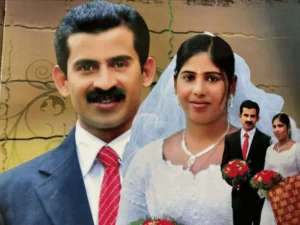Who is Nimisha Priya?
Nimisha Priya’s life journey from a humble background in Kerala to facing execution in a war-torn foreign land is a story of ambition, tragedy, and desperation. Here’s a detailed but easy-to-understand look at who she is, what happened, and where things stand today.
Key Information
| Detail | Information |
|---|---|
| Full Name | Nimisha Priya |
| Date of Birth | January 1, 1989 |
| Hometown | Kollengode, Palakkad, Kerala, India |
| Profession | Nurse |
| Moved to Yemen | 2008 (at age 19) |
| Family | Husband – Tomy Thomas; 1 daughter |
| Current Status | Facing death penalty in Yemen |
| Execution Date (Set) | July 16, 2025 |
Family and Husband
- Parents: Daily wage laborers from Kerala. Mother, Prema Kumari, now works as house help in Kochi.
- Husband: Tomy Thomas. Supported her early on in Yemen.

- Daughter: Lives in India with father after they returned due to financial issues.
- Sacrifices: Her mother sold their home to fund legal efforts.
Why Did Nimisha Go to Yemen?
- Reason: To support her poor family financially.
- Career move: Started working in hospitals; known for being hardworking and dedicated.
- Entrepreneurship: In 2015, she opened Al Aman Medical Clinic in Yemen.
Business Partnership Gone Wrong
- Legal Requirement: Yemeni law requires a local partner for foreigners to own businesses.
- Partner Chosen: Talal Abdo Mehdi, a former patient.
- Initial Phase: Business seemed successful.
- Things Turned Sour:
- Alleged financial fraud by Talal.
- Nimisha filed a police complaint in 2016.
- Talal arrested but released soon after.
Abuse and Trapped in Yemen
Nimisha accused Talal of:
- Stealing clinic income
- Physical and sexual abuse
- Confiscating her passport – leaving her unable to return to India
She was isolated, under threat, and desperate to regain her freedom.
Crime That Changed Everything
In July 2017, Things turned deadly:
- Intent: Allegedly sedated Talal to recover her passport.
- Drug Used: Ketamine
- Outcome: Talal died from an overdose.
- What Followed: She and a Yemeni assistant allegedly dismembered the body and hid it in a water tank.
What may have started as a desperate act turned into a serious criminal case.
Arrest and Legal Troubles
- Arrested: August 2017, near the Yemen-Saudi border while trying to escape.
- Trial Issues:
- No interpreter
- No legal counsel
- Conducted entirely in Arabic
- Conviction: Death sentence in 2018
- Appeals: Rejected in 2023
- Execution Date Set: July 16, 2025
How Yemen’s Legal System Works
- Law Based On: Sharia (Islamic law)
- Death Penalty: Allowed for murder and other major crimes
- Blood Money (Diya): Victim’s family can accept financial compensation to forgive the crime
International Efforts to Save Her
- Goal: Prevent her execution
- Actions: Legal aid, fundraising, public awareness
Indian Government:
- Involved Since: Early stages
- Help Provided: Diplomatic efforts, coordination with Yemeni authorities
Blood Money Negotiations:
| Timeline | Development |
|---|---|
| June 2024 | $40,000 raised (half sent to embassy) |
| Sept 2024 | Talks stalled with victim’s family |
| Ongoing | More funds being raised, new diplomatic channels explored |
Human Side of the Story
- Nimisha’s mother traveled to Yemen in 2024 to personally plead for her daughter’s life.
- The case has left the family financially and emotionally shattered.
Key Takeaways
- Foreign workers face serious risks in unfamiliar legal systems.
- Legal representation and interpreters are crucial in international cases.
- Partnership laws abroad can be risky if not properly managed.
- Desperation and isolation can lead people to make tragic decisions.
Current Status
| Status | Details |
|---|---|
| Location | Sana’a Central Prison, Yemen |
| Scheduled Execution | July 16, 2025 |
| Blood Money Accepted? | Not yet |
| Indian Government’s Role | Ongoing negotiations and legal/diplomatic efforts |
| Hope for Reprieve? | Possible through blood money or political intervention |
- Execution postponed: Nimisha Priya, a 38-year-old nurse from Kerala on death row in Yemen, was scheduled for execution on July 16, 2025, but that date has now been temporarily delayed, providing her and her family a crucial second chance.
- What happened in the case: Priya was convicted for the 2017 killing of her Yemeni business partner, Talal Abdo Mahdi. She says it happened after he allegedly tortured her and held her passport hostage, and She tried to make him unconscious so she could escape, but he died during the attempt, and his body was later cut into pieces.
- Diplomatic limits acknowledged: The Indian government admitted to the Supreme Court that it had done all it could through official channels. Yemen’s internal conflict and lack of diplomatic ties with the Houthi-controlled areas severely limited traditional diplomacy.
- Faith stepped in: With embassies’ reach limited, Indian and Yemeni religious leaders took action. Kanthapuram A.P. Aboobacker Musliyar, known as the Grand Mufti of India, coordinated with Yemeni Sunni cleric Sheikh Habib Umar bin Hafiz. This religious intervention helped arrange talks between Priya’s supporters and the victim’s family.
- First contact with the victim’s family: Through these religious back-channels, they successfully got Talal’s family to the table. A provisional agreement was reached to pause the execution, giving more time for further negotiations.
- Blood money (diyya) under Sharia law: In Yemen’s legal system, the victim’s family can forgive the accused if blood money is accepted. Indian supporters reportedly offered up to $1 million (₹8–11 crore), though the Talal family has yet to finalize acceptance.
- Local and political support in India: Kerala’s Chief Minister Pinarayi Vijayan and opposition leader V. D. Satheesan welcomed the reprieve and recognized the role of the Mufti and an international support council in securing this outcome.
- Family reaction: Nimisha’s husband, Tomy Thomas, said they were “happy and relieved” by the postponement and vowed to continue pursuing her safe return.
Final Thoughts
Nimisha Priya’s case is a powerful reminder of:
- The vulnerability of migrant workers, especially women.
- The importance of international legal aid and human rights protections.
- The need for stronger systems to protect Indian citizens abroad.
As the world watches, Nimisha’s fate rests on continued efforts, hope, and the will of those who still believe her life can be saved.
Read more biographies and success stories of business leaders, celebrities, healthcare professionals etc. at Leader Biography.






